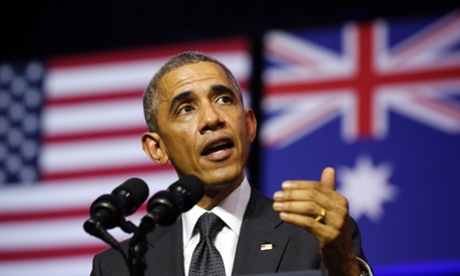 Barack Obama has stared down both Republican hostility at home and the reluctance of his Australian G20 hosts to insist that the world can clinch a new climate change deal next year.
Barack Obama has stared down both Republican hostility at home and the reluctance of his Australian G20 hosts to insist that the world can clinch a new climate change deal next year.
The president used a speech on the sidelines of the G20 in Brisbane, Australia, to confirm what was revealed by the Guardian on Friday: that the US would be contributing $3bn to the Green Climate Fund that aims to help developing nations cope with the effects of global warming.
And he insisted nowhere had more to lose from rising temperatures than the Asia Pacific region and Australia in particular.
“No nation is immune and every nation has a responsibility to do its part,” Obama said. “You will recall at the beginning I said the US and Australia has a lot in common. Well one of the things we have in common is we produce a lot of carbon … which means we’ve got to step up.”
In the backrooms of the G20 meeting, Australia was continuing to resist language in the official communique encouraging countries to makepledges to the Green Climate Fund, but to a rousing reception at a local university, Obama announced the $3bn US commitment.
Obama said the new funding would help vulnerable communities with early-warning systems, stronger defences against storm surges, and climate-resilient infrastructure, while supporting farmers to plant more durable crops.
He hailed the deal he struck in Beijing on Wednesday, saying China’s pledge to ensure its carbon emissions peaked by 2030 was historic.
“The reason that’s so important is because if China as it develops adapts the same per capita carbon emissions as advanced economies like the US or Australia, this planet doesn’t stand a chance because they’ve got a lot more people,” Obama said.
“So them setting up a target sends a powerful message to the world that all countries, whether you are a developed country, a developing country or somewhere in between, you’ve got to be able to overcome old divides, look squarely at the science and reach a strong global climate agreement next year.
“And if China and the US can agree on this then the world can agree on this, we can get this done and it is necessary for us to get it done.”
Obama faces domestic political challenges implementing greater curbs on greenhouse gas emissions in the US after the Republicans won control of both houses of Congress in mid-term elections last week.
Mitch McConnell, who will take over as the majority leader of the Senate, has called the China deal part of Obama’s “ideological war on coal” and signalled that Republicans would seek to ease the burden of power station emission regulations.
The Australian prime minister, Tony Abbott, told G20 counterparts earlier on Saturday they could raise any issue they liked during the leaders’ retreat.
Abbott has previously resisted calls to make climate change a substantive agenda item at the G20, arguing the summit should focus on economic issues including increasing global growth.
Abbott himself referred to his government’s domestic policies, including the abolition in July of Australia’s carbon pricing scheme, when he spoke at the leaders’ retreat.
Obama struck a markedly different tone in his speech to students and invited guests at the University of Queensland.
“I know that there has been a healthy debate in this country about it,” the president said. “Here in the Asia Pacific nobody has more at stake when it comes to thinking about, and then acting on, climate change.
“Here a climate that increases in temperature will mean more extreme and frequent storms, more flooding, rising seas that submerge Pacific Islands.
“Here in Australia it means longer droughts, more wildfires. The incredible natural glory of the Great Barrier Reef is threatened. Worldwide this past summer was the hottest on record.”
Obama said he had not yet had time to go to the Great Barrier Reef, but he wanted it to be protected so his daughters and generations to come could see the natural wonder.
The president made a direct pitch to young people in the audience, urging them to speak up in support of strong action on climate change because they deserved to inherit a clean, healthy, sustainable world.
He said it was natural “that those of us who start getting grey hair are a little set in their ways” and had entrenched interests. Companies had made investments in certain energy sources, the president said, so change could be “uncomfortable and difficult”.
“That’s why it’s so important for the next generation to be able to step in and say, you know, it doesn’t have to be this way,” Obama said.
Earlier on Saturday the UN secretary general, Ban Ki Moon, said he had been briefed that the leaders were actively discussing the issue of a climate change, which he nominated as “the defining issue of our times” and therefore a natural topic of G20 discussion.
He called on the G20 to “take a lead” on climate and urged G20 countries to make “ambitious pledges” to the Green Climate Fund.
China is the biggest emitter of greenhouse gases in the world. Its deal with the US, the second-largest emitter, has been seen as building momentum for strong post-2020 targets to be agreed at a UN climate conference in Paris next year.
China’s vice minister of finance, Zhu Guangyao, told reporters at the G20 on Saturday that China would work hard to ensure its emissions peaked before 2030. He said that if the Chinese economy developed too fast for the environment to sustain “we must make adjustments to our policies in a timely way so we can minimise the impact on our environment”.
http://www.theguardian.com/world/2014/nov/15/barack-obama-tells-g20-a-global-climate-change-deal-is-possible-and-vital


